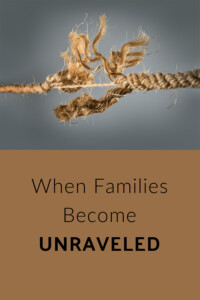When Families Become Unraveled

Unraveled = positive
To unravel something can be positive or negative.
Helping my sister roll her skeins of yarn into balls could be difficult. Sometimes we had to sort out the different pieces of yarn so we could complete the task. Unraveling the tangle was a good thing.
Unraveling can be like solving a mystery or a puzzle. The end result is positive, because the mystery is solved. The puzzle is put together without any missing pieces, and the item or situation can be used again as it was intended. This only happens when something is unraveled correctly.
Unraveled = negative
There’s another kind of unraveling that is negative. That means “to cause to come apart,” speaking specifically of something which should be kept or held together. When my sister was in the middle of crocheting an afghan, she didn’t want us to come along and grab the last part of yarn still hooked in the crochet hook. If we pulled that piece of yarn, her entire project was guaranteed to become null and void. As kids, we’d have that thing apart so fast when no one was watching. It was not a pleasant sight or feeling for her, for sure. All those hours of crocheting, following directions, and unraveling a few stitches when she missed the directions were gone.
There was nothing left to do but start again. Yet, the only way to complete the afghan was to begin at the place the unraveling began.
Unraveled trails
It’s like getting lost or getting off track. We must retrace our steps and go back to where we got off the trail. To figure out how we are lost, we have to begin at the place where we knew our way.
That’s how it is with relationships. A relationship that turns sour doesn’t plummet to the bottom of a cliff overnight. It usually starts with one foot veering slightly off the path, rather than a huge jump in the opposite direction. Sometimes that happens when our focus shifts from where we should be headed to a different place or angle.

New Beginnings
Relationships that unravel do not usually do so overnight. Usually there is no sudden event that pulls the rope in two or in shreds. Beginning or restoring relationships doesn’t happen overnight, either. It takes time, and it takes willing effort on both parties.
Just like finding the place where we lost the trail, we need to go back to the place the relationship changed. In family relationships, events take place and family dynamics change affecting relationships. Sometimes a loss, a point of betrayal, or a shifting of focus to other things cause us to step off the path. At those times, if we are willing to go back the trail, we will see when and where things changed.
If we want restored relationships, we have to go back to the place the relationship went sour, to the point we lost the trail. We have to go back to that point and blaze a new trail. This means we have to clean up and clear the debris so we can forge the trail. You simply cannot forge a new trail by stomping over brambles and briars. You have to clean it up and clean it out. This takes work, and sadly, some folks aren’t willing to do the work necessary to restore what is lost. More often than not, we know what happened, but we are not willing to “go there”. To do so is too painful, requiring honesty and accountability that we are not willing to embrace, and is simply (we think) too much work.
Changing focus
When a spouse or parents focus on what matters least instead of what matters most, the other spouse and kids are affected. Kids don’t care about money and possessions if there is tension in the home. What they want – and need – is security and stability that no financial success can offer. A committed spouse doesn’t care about keeping up with the Joneses or getting the best promotion. The key to a secure and stable relationship is a shared focus which encourages all parties to change and walk together with the same end result in mind.
Restoration truly comes when our focus for the future is more important than reliving the past and simply suffering in the present. Acknowledging our failings, repenting of our wrongful ways of relating, seeking forgiveness, and making restitution provide fertile soil for genuine restoration of a relationship. Only then can we move forward. There is hope when we truly want to recover what has been lost. There is nothing, absolutely nothing, that is too hard for God. He is a God of redemption and restoration!









I love this, Gert.
God is truly able to restore; even if I don’t see it in the moment, He is surely working and teaching in whatever brokenness we find ourselves. I love Him for how patient and long-suffering He is.
I like how you pointed out there is a positive and negative aspect of unraveling. Humbling myself is the hardest part of facing the unraveling for me. I’m not usually afraid of hard work, but pride trips me up.
It’s tough being vulnerable. But it can create the platform for restoration as you point out.
In John Ortberg’s ‘The Life You’ve Always Wanted’ he says the ministry of bearing with one another is hearing God speak through difficult people.
I liked your entry on the air fryer- now I want to try your chicken recipe!
Thanks, Kristen! I like that quote by John Ortberg. Thanks so much for sharing and for dropping in!